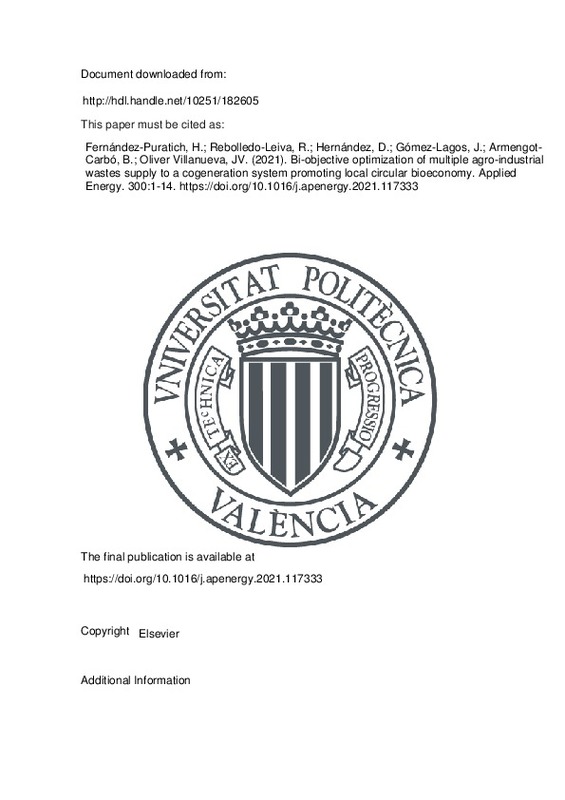JavaScript is disabled for your browser. Some features of this site may not work without it.
Buscar en RiuNet
Listar
Mi cuenta
Estadísticas
Ayuda RiuNet
Admin. UPV
Bi-objective optimization of multiple agro-industrial wastes supply to a cogeneration system promoting local circular bioeconomy
Mostrar el registro sencillo del ítem
Ficheros en el ítem
| dc.contributor.author | Fernández-Puratich, Harald
|
es_ES |
| dc.contributor.author | Rebolledo-Leiva, Ricardo
|
es_ES |
| dc.contributor.author | Hernández, Diógenes
|
es_ES |
| dc.contributor.author | Gómez-Lagos, Javier
|
es_ES |
| dc.contributor.author | Armengot-Carbó, Bruno
|
es_ES |
| dc.contributor.author | Oliver Villanueva, José Vicente
|
es_ES |
| dc.date.accessioned | 2022-05-13T18:05:58Z | |
| dc.date.available | 2022-05-13T18:05:58Z | |
| dc.date.issued | 2021-10-15 | es_ES |
| dc.identifier.issn | 0306-2619 | es_ES |
| dc.identifier.uri | http://hdl.handle.net/10251/182605 | |
| dc.description.abstract | [EN] This research analyses and proposes an optimization model for the supply of biomass to a combined heat and power (CHP) system with a supply of different biomasses at a local level under Mediterranean conditions. The research aims to quantitatively assess whether it is economical and environmentally beneficial to transport various types of biomasses to the CHP plant, instead of landfilling, determining the biomass required according to the availability of power generation for each biomass of agricultural and agro-industrial origin. To do this, a representative case study has been developed in the Maule Region, Chile to supply power and heat to public, private, and residential buildings. The main biomasses analyzed are olive pomace, fruit pits and vineyard pruning. The results demonstrate that the supply of residual biomass to the CHP plant avoids the emission of CO(2)e generated by final disposal. Regarding the minimization of CO(2)e emissions, pruning residues are identified as the first supply option, due to their high heating value. Regarding cost minimization, olive pomace is identified as the first option, followed by fruit pits and pruning material. Furthermore, transport is not a major contributing cost or environmental factor when biomass sources are close to the CHP system, up to a maximum supply radius of 30 km. Finally, despite seasonality of agricultural biomass supply under Mediterranean conditions, it is feasible to adequately supply a small-scale CHP plant. However, this increases the storage costs involved. Other lignocellulosic biomasses could be used to optimize costs and environmental benefits. | es_ES |
| dc.description.sponsorship | Ricardo Rebolledo-Leiva would like to thank CONICYT-PFCHA/Magister Nacional/201922190179 for their financial support. Javier E. Gomez-Lagos would like to thank CONICYT-PFCHA/Doctorado Nacional/21191364 for their financial support. Diogenes Hernandez ac-knowledges funding from FONDECYT, Chile, project N?. 11200398. | es_ES |
| dc.language | Inglés | es_ES |
| dc.publisher | Elsevier | es_ES |
| dc.relation.ispartof | Applied Energy | es_ES |
| dc.rights | Reconocimiento - No comercial - Sin obra derivada (by-nc-nd) | es_ES |
| dc.subject | Multi-objective optimization | es_ES |
| dc.subject | Biomass | es_ES |
| dc.subject | Bioenergy | es_ES |
| dc.subject | Optimization | es_ES |
| dc.subject | CO2 emissions | es_ES |
| dc.subject | Supply chain | es_ES |
| dc.subject.classification | INGENIERIA AGROFORESTAL | es_ES |
| dc.title | Bi-objective optimization of multiple agro-industrial wastes supply to a cogeneration system promoting local circular bioeconomy | es_ES |
| dc.type | Artículo | es_ES |
| dc.identifier.doi | 10.1016/j.apenergy.2021.117333 | es_ES |
| dc.relation.projectID | info:eu-repo/grantAgreement/CONICYT//201922190179/ | es_ES |
| dc.relation.projectID | info:eu-repo/grantAgreement/CONICYT//21191364/ | es_ES |
| dc.relation.projectID | info:eu-repo/grantAgreement/FONDECYT//11200398/ | es_ES |
| dc.rights.accessRights | Abierto | es_ES |
| dc.contributor.affiliation | Universitat Politècnica de València. Departamento de Ingeniería Rural y Agroalimentaria - Departament d'Enginyeria Rural i Agroalimentària | es_ES |
| dc.description.bibliographicCitation | Fernández-Puratich, H.; Rebolledo-Leiva, R.; Hernández, D.; Gómez-Lagos, J.; Armengot-Carbó, B.; Oliver Villanueva, JV. (2021). Bi-objective optimization of multiple agro-industrial wastes supply to a cogeneration system promoting local circular bioeconomy. Applied Energy. 300:1-14. https://doi.org/10.1016/j.apenergy.2021.117333 | es_ES |
| dc.description.accrualMethod | S | es_ES |
| dc.relation.publisherversion | https://doi.org/10.1016/j.apenergy.2021.117333 | es_ES |
| dc.description.upvformatpinicio | 1 | es_ES |
| dc.description.upvformatpfin | 14 | es_ES |
| dc.type.version | info:eu-repo/semantics/publishedVersion | es_ES |
| dc.description.volume | 300 | es_ES |
| dc.relation.pasarela | S\442773 | es_ES |
| dc.contributor.funder | ASSOCIATION CLIMATE KIC | es_ES |
| dc.contributor.funder | Fondo Nacional de Desarrollo Científico y Tecnológico, Chile | es_ES |
| dc.contributor.funder | Comisión Nacional de Investigación Científica y Tecnológica, Chile | es_ES |
| dc.subject.ods | 07.- Asegurar el acceso a energías asequibles, fiables, sostenibles y modernas para todos | es_ES |
| dc.subject.ods | 09.- Desarrollar infraestructuras resilientes, promover la industrialización inclusiva y sostenible, y fomentar la innovación | es_ES |
| dc.subject.ods | 15.- Proteger, restaurar y promover la utilización sostenible de los ecosistemas terrestres, gestionar de manera sostenible los bosques, combatir la desertificación y detener y revertir la degradación de la tierra, y frenar la pérdida de diversidad biológica | es_ES |







![[Cerrado]](/themes/UPV/images/candado.png)

